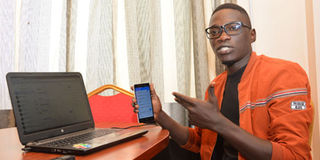Prime
Universities key in supporting student innovations

Innocent Nyato, a third year Information Technology student at Kampala International University explains how his medical application called Personal Clinic will work. PHOTO BY GODFREY LUGAAJU
What you need to know:
- Innovative minds are not limited.
- However, universities play a central role in unearthing, encouraging, nurturing and supporting student innovations.
Innovative minds are not limited. However, universities play a central role in unearthing, encouraging, nurturing and supporting student innovations.
Jude Sempijja, a second year midwifery student at Lira University, was for example able to start his Social Care initiation – where he does youth mentorship and character building because the university gave him a platform.
Under usual circumstances, a lecturer goes before students and shares knowledge as they listen. From time to time, the students are assessed through course work and exams to see if they are fit to be awarded diplomas, degrees or any other qualification. Aside from a few science-based courses, much of the learning process is theoretical.
Dr Emeka Akaezuwa, a lecturer and dean Faculty of Science and Technology at International University of East Africa, says at university level there is need to move past theoretical learning and incorporate processes that can challenge and stimulate a student’s thinking faculties so that they can innovate.
And in fact many universities are moving past the conventional streak, with some showing proof of their work.
At Kampala International University for instance, Innocent Nyato, a third year student, recently innovated a medical application called Personal Clinic.
He admits that he did this with the support of the university in 2017. “The application, which is in its final stages, can help users find and make appointments with doctors, find hospitals in their different localities and helps in diagnostics,” Nyato explains.
“I decided not to make it a non-downloadable application, because when you make an application, many people do not download to install it on their phones or computers – which is de-motivating to developers,” he says. To make it different and easy to access, his application can be accessed by one simply logging onto their Facebook page.
“Facebook has a platform where developers can run their innovations, so I utilised this platform. If you have a Facebook account or Facebook messenger, one simply searches for Personal Clinic and can access the application,” he says.
This medical application is also very conversational in a way that when one logs on to it, they can input information, and the application brings them the necessary feedback.
Nyato explains that, “In addition to helping you find doctors, hospitals and diagnostics, the app also works within one’s location, so one selects the location in which they live and can easily access data specific to their location.”
The process
He further explains that to get in touch with doctors, these are categorised in their specific fields and one chooses an option depending on the doctor they need. They can also be able to make an appointment with that doctor since all contact details are availed.
For the diagnostics; one can input symptoms of how they are feeling and to avoid self-medication and drug abuse, the application does not directly give one a diagnosis, but rather, directs you to hospitals or doctors they might need to see.
“We gathered all the public data that different hospitals and doctors put out,” Nyato explains how they get information on hospitals and doctors.
Medical solutions
In a sea of ideas, most of them Information Communication and Technology-based, Nyato says not many people have ventured in this field. “I discovered that it was rare to find people building medical-related apps. I thought, if I do not do it, who will?” he asserts.
Nyato says that as an Information Technology student, the university has given him the platform. “At the school of computing for example, we have a resource lab that provides a platform for students to do and show their innovations.”
Having joined the university in 2015, he joined this platform and I got inspired by other students who were developing and building innovations.
“I also have a number of friends who are developers. Personally, I exploited this platform and exhibitions. When they tell you to do something beyond class to showcase to other people and the world, then that causes one to think beyond the usual,” he adds.
The journey to usage
“The application is not yet available to the public, but we are in the final stages of making it available. Right now, it is only accessible by me and a few friends who are testing it. We still want to include data from all districts in Uganda,” Nyato says.
His plan for the future is for the application to cover East Africa and beyond. “I think school is just to give you the opening, and it lets you utilise other opportunities and resources that come along. I spend a lot of time outside school activities self-educating myself. At the end of the day, it is not the first class degree that matters, but the right skills,” he says.
Every growing economy today, is highly dependent on technology, which gives innovators an opportunity to offer new solutions.



